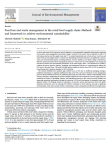Olabode O., Kumar N., De D. (2025). Food loss and waste management in the retail food supply chain: methods and framework to achieve environmental sustainability. Journal of Environmental Management, 01/07/2025, vol. 387, p. 125718.
https://doi.org/10.1016/j.jenvman.2025.125718
https://doi.org/10.1016/j.jenvman.2025.125718
| Titre : | Food loss and waste management in the retail food supply chain: methods and framework to achieve environmental sustainability (2025) |
| Auteurs : | O. Olabode ; N. Kumar ; D. De |
| Type de document : | Article |
| Dans : | Journal of Environmental Management (vol. 387, July 2025) |
| Article en page(s) : | p. 125718 |
| Langues : | Anglais |
| Langues du résumé : | Anglais |
| Catégories : |
Catégories principales 08 - ALIMENTATION ; 8.3 - Politique et Sécurité AlimentaireThésaurus IAMM GASPILLAGE ALIMENTAIRE ; CHAINE D'APPROVISIONNEMENT ; COMMERCE ; VENTE AU DETAIL ; DURABILITE |
| Résumé : | Food loss and waste (FLW) represents critical challenge to environmentally sustainable development, impacting food security, waste management, and climate change. One-third of the world's food is disposed of, with 13 % lost between harvest and the supply chain and 17 % wasted domestically and in food services. Food loss and waste (FLW) in retail supply chains is a critical issue demanding new frameworks due to its significant economic, social, and environmental impacts, including pollution, resource depletion, and climate change contributions. Effective operational and inventory management practices to reduce FLW can yield significant cost savings and increased economic and environmental performance of the retail supply chain. A new framework is needed to combine all aspects related to logistics, packaging, and management practices to comprehensively address the FLW issue in the retail chain. This study critically analyses empirical research from 2009 to 2025 to identify key research gaps and to propose strategies for FLW reduction. The research identifies three primary gaps: limited focus on FLW due to inefficient packaging strategies, insufficient information on logistical inefficiencies that cause FLW, and scarce literature on how management practices affect perishable food chain. By addressing these gaps, the study aims to enhance understanding of FLW reduction strategies, emphasizing the need for integrated approaches and cooperation across the supply chain. By examining the impact of packaging, logistics, and management practices, this research provides insights into improving operational performance through the reduction of FLW and development of sustainable waste management systems. The findings underscore importance of proactive actions and innovation from both public authorities and private sector in reducing FLW. Effective strategies for FLW reduction can lead to significant environmental, social, and economic benefits, contributing to a more sustainable and efficient food supply chain. |
| Cote : | En ligne |
| URL / DOI : | https://doi.org/10.1016/j.jenvman.2025.125718 |







